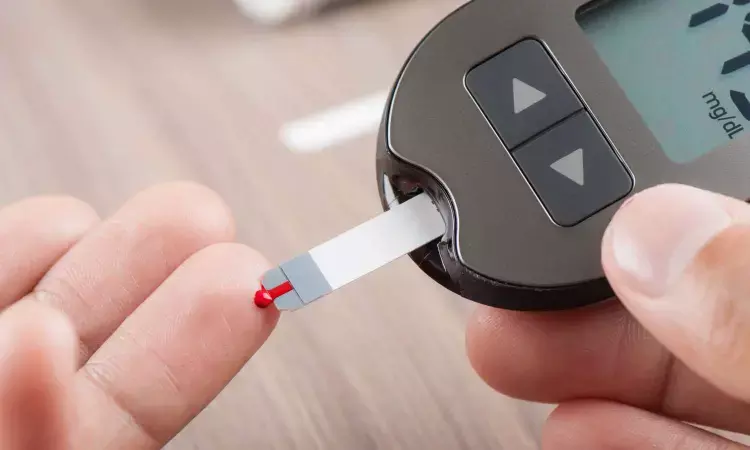- Home
- Medical news & Guidelines
- Anesthesiology
- Cardiology and CTVS
- Critical Care
- Dentistry
- Dermatology
- Diabetes and Endocrinology
- ENT
- Gastroenterology
- Medicine
- Nephrology
- Neurology
- Obstretics-Gynaecology
- Oncology
- Ophthalmology
- Orthopaedics
- Pediatrics-Neonatology
- Psychiatry
- Pulmonology
- Radiology
- Surgery
- Urology
- Laboratory Medicine
- Diet
- Nursing
- Paramedical
- Physiotherapy
- Health news
- Fact Check
- Bone Health Fact Check
- Brain Health Fact Check
- Cancer Related Fact Check
- Child Care Fact Check
- Dental and oral health fact check
- Diabetes and metabolic health fact check
- Diet and Nutrition Fact Check
- Eye and ENT Care Fact Check
- Fitness fact check
- Gut health fact check
- Heart health fact check
- Kidney health fact check
- Medical education fact check
- Men's health fact check
- Respiratory fact check
- Skin and hair care fact check
- Vaccine and Immunization fact check
- Women's health fact check
- AYUSH
- State News
- Andaman and Nicobar Islands
- Andhra Pradesh
- Arunachal Pradesh
- Assam
- Bihar
- Chandigarh
- Chattisgarh
- Dadra and Nagar Haveli
- Daman and Diu
- Delhi
- Goa
- Gujarat
- Haryana
- Himachal Pradesh
- Jammu & Kashmir
- Jharkhand
- Karnataka
- Kerala
- Ladakh
- Lakshadweep
- Madhya Pradesh
- Maharashtra
- Manipur
- Meghalaya
- Mizoram
- Nagaland
- Odisha
- Puducherry
- Punjab
- Rajasthan
- Sikkim
- Tamil Nadu
- Telangana
- Tripura
- Uttar Pradesh
- Uttrakhand
- West Bengal
- Medical Education
- Industry
Tight blood sugar control fails to Impact Outcomes in patients not receiving early parenteral nutrition: NEJM

In critically sick patients who did not receive early parenteral nutrition, tight glucose control had no impact on the duration of required ICU care or mortality rates, says an article published in New England Journal of Medicine. The study involved over 9,000 patients, aimed to address the ongoing debate about the benefits and risks of tight blood-glucose control in the ICU.
The study assigned patients upon ICU admission to one of two groups: liberal glucose control or tight glucose control. The liberal group only initiated insulin treatment when blood glucose levels exceeded 215 mg per deciliter, while the tight control group used the LOGIC-Insulin algorithm to maintain blood glucose levels between 80 to 110 mg per deciliter. Additionally, both groups refrained from using parenteral nutrition for one week.
The results of the trial are eye-opening. Among the 9,230 patients enrolled, there was no significant difference in the length of ICU stay between the two groups. This finding suggests that tight glucose control did not result in shorter ICU stays. Furthermore, the 90-day mortality rate was almost identical in both groups, with 10.1% for liberal glucose control and 10.5% for tight glucose control. This indicates that tight glucose control did not have a significant impact on patient survival.
The study also found that the incidence of new infections, the duration of respiratory and hemodynamic support, the time to discharge alive from the hospital, and ICU and hospital mortality rates were similar between the two groups. However, tight glucose control seemed to have a positive effect in reducing the prevalence of severe acute kidney injury and cholestatic liver dysfunction.
One of the remarkable aspects of this research is that it sheds light on the importance of context in medical treatments. The absence of early parenteral nutrition might explain why these findings differ from some previous studies that suggested potential benefits of tight glucose control.
Reference:
Gunst, J., Debaveye, Y., Güiza, F., Dubois, J., De Bruyn, A., Dauwe, D., De Troy, E., Casaer, M. P., Haghedooren, R., Jacobs, B., Meyfroidt, G., Wouters, P. J., Stessel, B., … Van den Berghe, G. (2023). Tight Blood-Glucose Control without Early Parenteral Nutrition in the ICU. In New England Journal of Medicine (Vol. 389, Issue 13, pp. 1180–1190). Massachusetts Medical Society. https://doi.org/10.1056/nejmoa2304855
Neuroscience Masters graduate
Jacinthlyn Sylvia, a Neuroscience Master's graduate from Chennai has worked extensively in deciphering the neurobiology of cognition and motor control in aging. She also has spread-out exposure to Neurosurgery from her Bachelor’s. She is currently involved in active Neuro-Oncology research. She is an upcoming neuroscientist with a fiery passion for writing. Her news cover at Medical Dialogues feature recent discoveries and updates from the healthcare and biomedical research fields. She can be reached at editorial@medicaldialogues.in
Dr Kamal Kant Kohli-MBBS, DTCD- a chest specialist with more than 30 years of practice and a flair for writing clinical articles, Dr Kamal Kant Kohli joined Medical Dialogues as a Chief Editor of Medical News. Besides writing articles, as an editor, he proofreads and verifies all the medical content published on Medical Dialogues including those coming from journals, studies,medical conferences,guidelines etc. Email: drkohli@medicaldialogues.in. Contact no. 011-43720751


